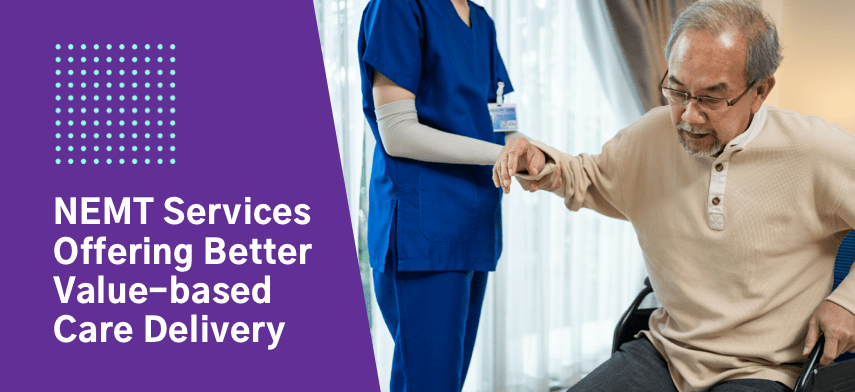To provide high-quality value-based care, several aspects are involved in the healthcare delivery process. One major feature includes the efficiency of healthcare transportation services when it comes to addressing social determinants of health.

NEMT services work in bridging the barriers faced by many members, especially the senior population. Non-emergency medical transportation is beneficial for both providers and patients to prescribe trips when they need to ensure patients are reaching home safely post their visits.
Maximizing NEMT Potential to Address Value-based Care
The transition to value-based care services has changed the way care is delivered today. It has become a crucial factor to observe, identify and support patients who need help with non-medical services like transportation with early interventions to avoid having adverse health outcomes. It is not just about charging a fee when it comes to medical care transportation but it’s aligned with the quality of care to quantity health outcomes. For providing healthcare consumers with proper access to non-emergency medical transportation, organizations are aligning these services as a part of their value offering.
NEMTPulse helps to provide the NEMT services and software to Health Plans, NEMT Brokers, Transport Providers, and other health care and non-health care-related organizations. The services are customizable according to the requirements of the organizations.
The features of NEMTPulse includes:
- Private cloud hosted branded solutions
- Real-time visibility of drivers
- Quick intake process
- Reporting capabilities
- Route optimization
- Flexibility with integrations and customizations
- Better data control
- HIPAA compliant solution
Providing healthcare transportation services these days also includes several other non-medical care services such as grocery shopping and pharmacy visits. NEMT services help providers to align their continuity of care with better access for patients to and from their doctor's appointments.
The technologies involved in NEMT solve various concerns that are related to payment and billing for the transportation of patients. The billing software for transportation becomes an efficient way to solve and manage the aspects of billing for the services provided. The process through this becomes more efficient and automated. In addition, the credentials of drivers and keeping their paperwork and training in place are vital.
The transportation software recognizes the needs of the members and empowers them to provide feedback through a system regarding their transportation providers. This remains to be a cause of bringing valuable access to patient care through better transportation access and good experience.
For the high-functionality of non-emergency medical transportation services, it needs to have an efficient tracking system. The tracking system provides intel regarding the driver dispatch and required details of driver and rider are provided at a single go for several vehicles. This ensures proper safety and security for riders. This enables patients to build strong communications that help NEMT providers to serve their members better. The transition to value-based care portrays that its organizations need to holistically think of the care that includes considering the social needs of patients.
With streamlined NEMT systems, time can be properly devoted to providing the best patient experience and satisfaction.
Determining SDOH with Value-based Care via NEMT Services
Populations residing in low-income communities and spaces are more likely to be affected by poor health conditions and life choices tied to social determinants of health. According to KFF, it has been observed that only 1 out of 5 Americans have Medicaid coverage and overall only 1 out of 3 members are covered under Medicare or Medicaid for people who are above 65 years of age persisting certain disabilities. About 3.6 million people residing in America have delayed or missed appointments due to the lack of transportation management systems.
Medicaid addresses the social determinants of health which helps to improve the health and well-being of populations residing in vulnerable communities. Medicaid provides enhanced access to healthcare services, by improving the accessibility of non-emergency medical transportation. This in turn allows patients to take transit for healthcare appointments, grocery delivery, meal delivery services, prescription refills, and other services.
NEMT services play a crucial role in recognizing and understanding the health disparities that can be brought on by the SDOH factor. It is also curbing the major healthcare problems in the USA, which is tackling the high rate of readmissions and ED visits once the patient is discharged from the hospitals. Hospitals and healthcare organizations are partnering up with NEMT services companies by offering rides to patients for follow-up appointments. Hence, keeping their physical and mental health in check and reducing the readmission rates through better medical care transportation services.
NEMT is helping people cope with varying environmental changes and conditions by allowing them access to care transportation services without compromising on their health. People residing in rural and underserved communities are now capable of utilizing these transportation services for their need for food, medications, transportation to appointments, and more.

In conclusion
NEMT services have become an essential part of healthcare services. With integrated software like NEMTPulse, healthcare organizations and NEMT providers can offer their patients an incredible experience at affordable costs. Healthcare transportation services have become a necessity for not just care delivery but also for allowing patients to take a trip to the corner store, without compromising on their independence. Thus, NEMT services assist in the seamless and streamlined transition to value-based care by addressing the SDOH factors and keeping in mind the needs of providers and patients.

Author's Bio
